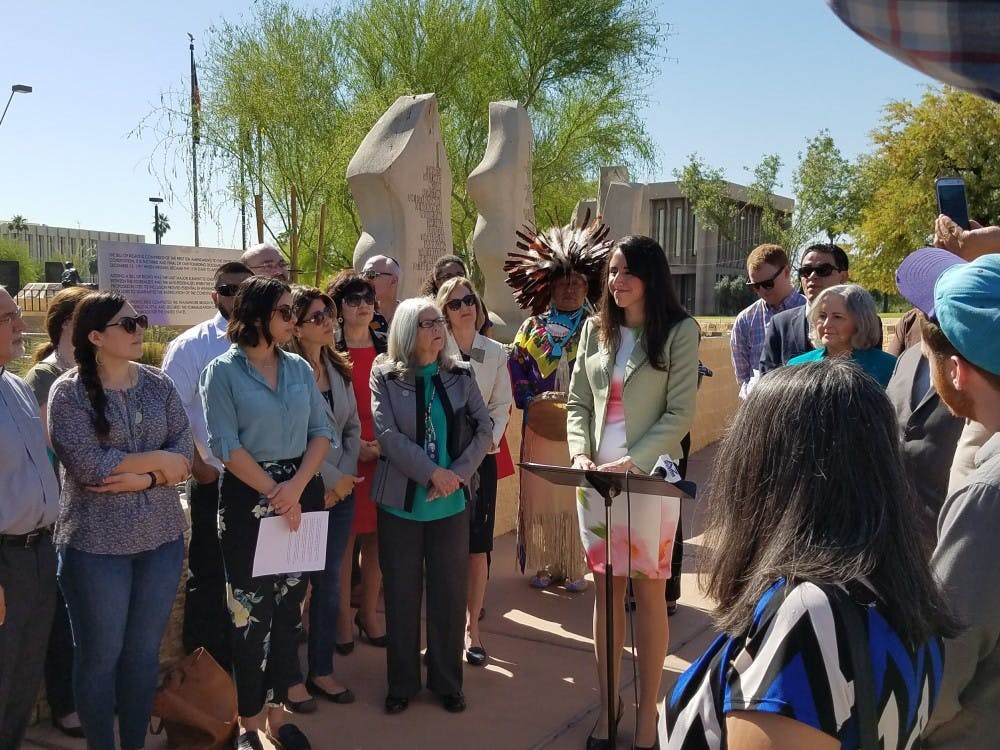State Rep. Athena Salman, D-Tempe, is in the middle of a national controversy over the meaning of prayer after she gave an invocation last Tuesday to begin the daily Arizona House session.
After Salman read a humanist prayer April 18, according to The Arizona Republic, many Arizona Republican representatives objected.
Speaker Javan "JD" Mesnard, R-Chandler, said Salman's reciting of the prayer was “out of line," citing a Feb. 16 memo requiring each invocation to mention a higher power.
Salman said that as the representative of Tempe, a relatively secular district that includes ASU's campus, her invocation was meant to better represent the constituents who voted for her. She also said that she did not see herself in violation.
“The goodness of humanity is a higher power,” Salman said.
Rep. Mark Finchem, R-Oro Valley, a member of a Christian sect, delivered a second invocation.
Finchem referred to Salman’s invocation as “arrogance,” provoking further remarks from Democratic members of the Arizona House of Representatives who defended the secular invocation.
Thursday morning members of Arizona’s interfaith networks and secular societies gathered at the Bill of Rights Memorial at Wesley Bolin Memorial Plaza to read the invocation together with several Democratic state legislature members including Salman.
During a press conference, Johnny Martin, an ASU religious studies student and founder of Sun Devils are Better Together, spoke as a convert to Islam.
"As a religious minority, I want to say how meaningful it is for me when someone like Representative Salman shares a secular prayer on the House floor," Martin said. "We want to be heard and valued just the same as the majority."
Members of diverse faith and humanist groups voiced similar feelings.
The imam of the Tempe mosque, Ahmad al-Akoum, recited Quranic verses as an additional prayer at the press conference.
“There is no compulsion in religion,” al-Akoum recited.
This was a theme throughout the statements, as each speaker said the organizations they represented recognized humanism as another minority faith.
Faith leaders reiterated that without protecting humanist invocations, all of their free practice of religion would be endangered.
Salman closed the press conference, looking shaken at first before calling for change and recognition of the United States and Arizona constitutions’ anti-establishment clauses.
Salman said she entered a protest into the record of the chamber later Thursday, calling for the rule requiring invocations to include a higher power to be revoked. Salman said this could cause further action against the Arizona House, particularly as national outlets began to cover the incident.
"I think it's a conversation worth having, and I'm having those conversations, but I don't know what that looks like in the future," Salman said.
Salman is the partner of state Sen. Juan Mendez, who previously served as a representative for Tempe. In that role, he also offered humanist invocations to open legislative sessions to similar reactions from the GOP-majority chamber.
In 2013, there was a large outcry when he quoted astrophysicist Carl Sagan in another secular invocation.
Salman said that with new House leadership, she expected a different reaction.
Mesnard’s rebuke of Salman’s humanist invocation was delivered on the same date as a decision by the U.S. Department of Defense to recognize humanism as a faith.
While humanism is increasing in prevalence and acceptance, the current controversy in the legislature shows the tension of accommodating secularism in previously religious spaces.
"There's a lot of humanists and non-theistic constituents that live in my districts, so I wanted to offer a prayer that reflected this community and share it with my colleagues," Salman said.
Reach the reporter at benjamin.steele@asu.edu or follow @blsteele17 on Twitter.
Like The State Press on Facebook and follow @statepress on Twitter.




